Generative AI has emerged as a remarkable force in the rapidly evolving healthcare landscape, reshaping the industry’s possibilities. It is a testament to human ingenuity with its ability to create new and valuable content autonomously.
As per Precedence Research, by 2030, the global artificial intelligence in the healthcare market will surpass USD 187.95 billion, growing at a CAGR of 37% from USD 15.1 billion in 2022.
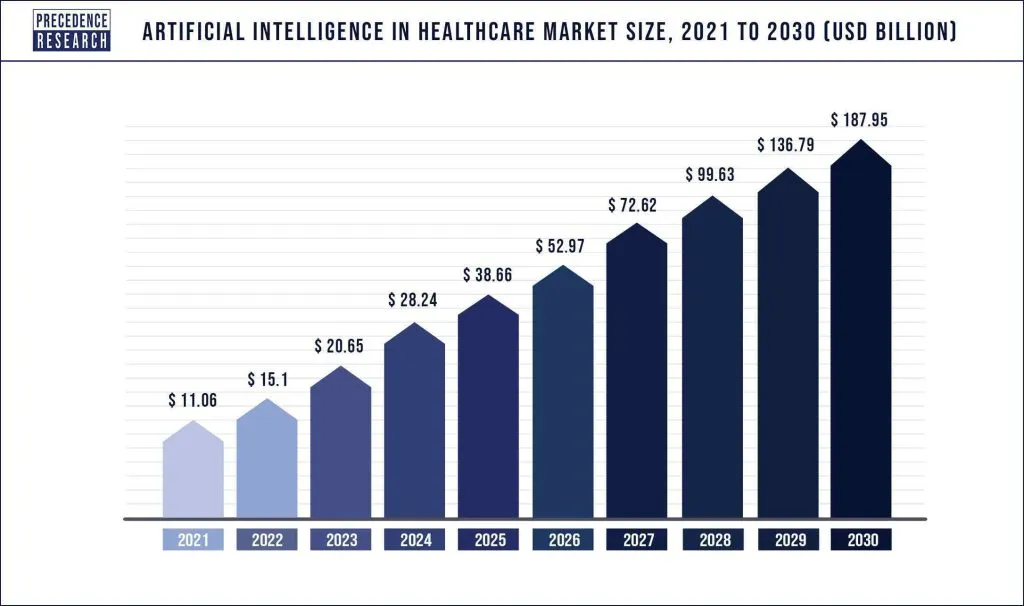
This technology’s capacity to innovate knows no bounds, extending its prowess to propel drug discovery, enhance disease diagnosis, facilitate patient care, and even revolutionize medical imaging.
Join us on a journey through the pivotal role of Generative AI in healthcare, where innovation meets compassion, and possibilities are redefined.
What is Generative AI?
Generative AI is a blend of data-driven creativity and advanced network architectures, primarily the Generative Adversarial Network (GAN) or Variational Autoencoder (VAE).
Learning Phase:
- The AI delves into a vast dataset.
- It identifies patterns, relationships, and subtle details.
- The goal is to understand and internalize the data’s essence.
Creation Phase:
- The model uses its knowledge to produce new content.
- Within the GAN, two networks operate: the generator and the discriminator.
- The generator makes new data resembling the original, while the discriminator assesses its authenticity.
- Through repeated generation and evaluation, the AI refines its creations, aiming for realism.
How does Generative AI work?
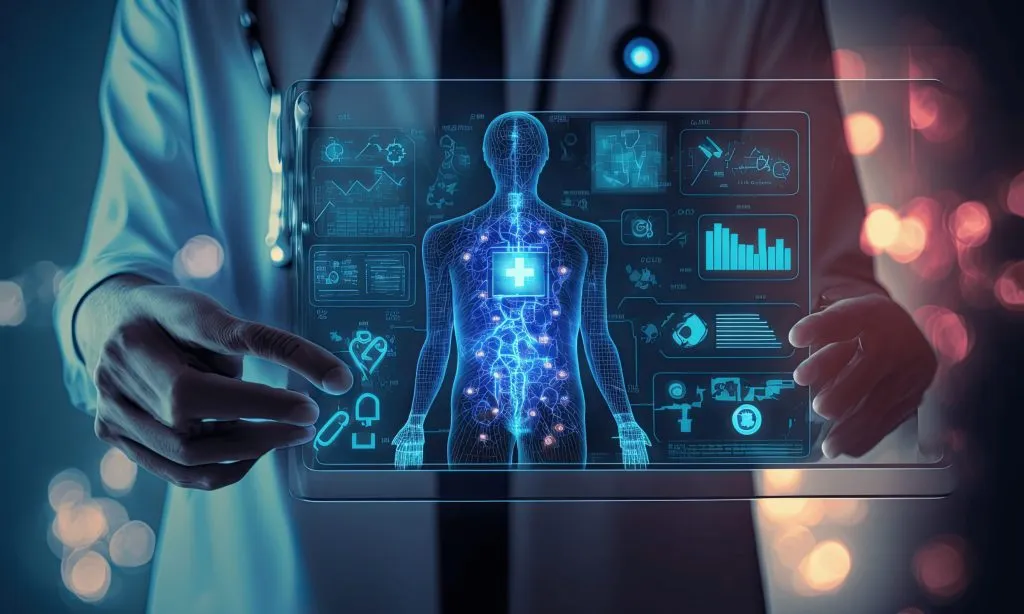
Generative AI functions as a sophisticated orchestrator of data-driven creativity. At its core lies a network architecture known as a generative model, typically the Generative Adversarial Network (GAN) or Variational Autoencoder (VAE). These models undergo a twofold process: learning and creation.
The AI system studies a vast dataset during the learning phase, discerning intricate patterns, relationships, and nuances. This immersion allows the model to grasp the underlying essence of the data it encounters, effectively internalizing its unique characteristics.
Subsequently, in the creation phase, the model deploys its acquired insights to fabricate new content autonomously. This involves a dance between two neural networks within the GAN architecture—the generator and the discriminator. The generator crafts new instances that aim to resemble the original data, while the discriminator critiques these creations for authenticity.
Through a continuous interplay of generation and evaluation, the model refines its output iteratively, inching ever closer to authenticity. As this delicate equilibrium advances, Generative AI births content imbued with uncanny realism, making it an invaluable tool across industries. Now, the question arises is, How generative artificial intelligence help in healthcare?
In healthcare, Generative AI harnesses this mechanism to synthesize medical images, devise personalized treatment plans, and even simulate patient scenarios for training. This transformative potential highlights Generative AI’s prowess as a catalyst for innovation, bridging the realms of data and creativity in profound ways.
Top Generative AI Use Cases in Healthcare Industry
Generative AI, with its advanced algorithms and data-driven approaches, is rapidly transforming the healthcare landscape. By offering solutions to age-old challenges and introducing innovative methodologies, it’s setting new standards in patient care, research, and treatment. Let’s delve deeper into its pivotal use cases in the healthcare sector, supported by data:
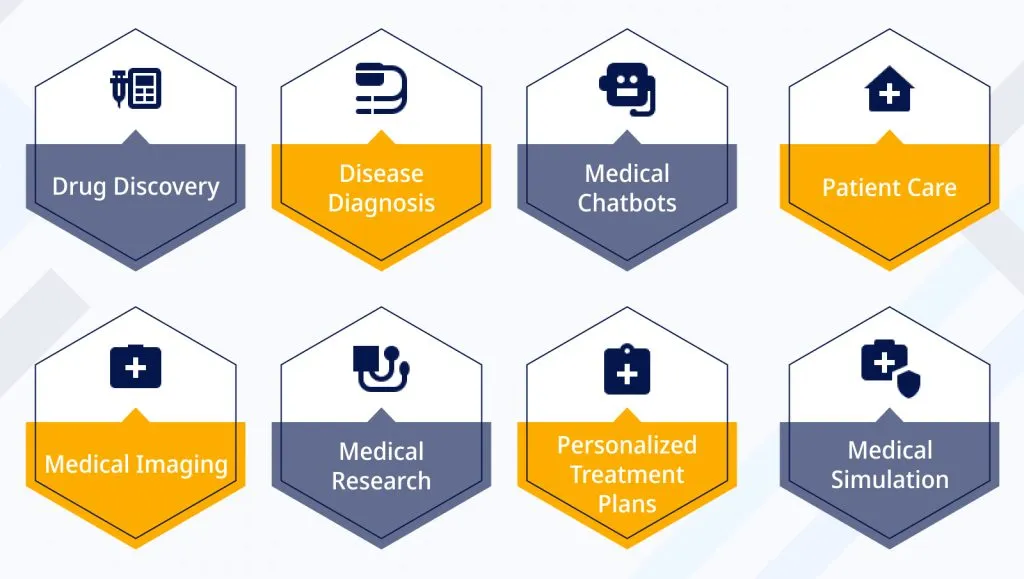
Use Case #1 – Drug Discovery:
Introduction: The pharmaceutical industry is in constant pursuit of new medications to combat evolving health challenges.
Industry Challenge: Traditional drug development is a lengthy process, often taking up to a decade and costing billions of dollars.
Generative AI Solution: Generative AI revolutionizes this by simulating countless molecular interactions in virtual environments. It can predict how different compounds can interact, thereby pinpointing potential drug candidates at a much faster rate than conventional methods. A study found that AI-driven drug discovery could lead to a potential savings of $28 billion annually for the pharmaceutical industry.
Use Case #2 – Disease Diagnosis:
Introduction: The essence of effective treatment lies in timely and accurate diagnosis.
Industry Challenge: Manual analysis of medical images and data can sometimes miss subtle indicators or early signs of diseases.
Generative AI Solution: Generative AI algorithms analyze medical images with a depth that goes beyond human capability. By recognizing patterns and anomalies in vast datasets, it aids clinicians in making more informed diagnostic decisions.
Use Case #3 – Medical Chatbots:
Introduction: In our digital age, patients seek instant and efficient communication channels.
Industry Challenge: Meeting the demand for real-time, accurate, and empathetic patient communication is a tall order.
Generative AI Solution: Generative AI powers chatbots to understand and respond to patient queries in real-time. By learning from vast datasets of medical information and patient interactions, these chatbots can provide accurate information, schedule appointments, and even offer preliminary symptom assessments.
Use Case #4 – Patient Care:
Introduction: The healthcare paradigm is shifting towards a more personalized approach.
Industry Challenge: Crafting care plans that cater to the unique needs of each patient is a complex endeavor.
Generative AI Solution: Generative AI amalgamates diverse patient data, from genetic information to lifestyle habits. By understanding these nuances, it can suggest care plans tailored to individual needs, ensuring a more holistic approach to health.
Transforming Healthcare with Generative AI
Use Case #5 – Medical Imaging:
Introduction: Medical images are the windows through which clinicians view the inner workings of the human body.
Industry Challenge: Ensuring clarity and accuracy in these images is paramount.
Generative AI Solution: Generative AI algorithms enhance medical images by refining their details, reducing artifacts, and even generating synthetic images that can be used for training other AI models, ensuring that clinicians have the best possible view.
Use Case #6 – Medical Research:
Introduction: The realm of medical research is vast, holding the promise of future health solutions.
Industry Challenge: Traditional research methodologies can be resource-intensive and time-consuming.
Generative AI Solution: Generative AI can simulate complex biological systems, enabling researchers to test hypotheses in virtual environments. This not only accelerates the research process but also opens doors to avenues previously deemed unexplorable.
Use Case #7 – Personalized Treatment Plans:
Introduction: In the era of personalized medicine, treatments need to be as unique as the patients themselves.
Industry Challenge: Designing treatments that cater to individual patient profiles without overwhelming resources is challenging.
Generative AI Solution: Generative AI analyzes a patient’s unique genetic makeup, medical history, and other relevant data. With this analysis, it can suggest treatment strategies optimized for each individual, ensuring the best possible therapeutic outcomes.
Use Case #8 – Medical Simulation:
Introduction: Training the next generation of healthcare professionals requires realistic and comprehensive scenarios.
Industry Challenge: Traditional training methods might not encompass the vast array of potential real-world situations.
Generative AI Solution: Generative AI creates hyper-realistic simulations, offering a diverse range of scenarios. This allows healthcare professionals to practice intricate procedures, refine their skills, and make critical decisions in a risk-free environment.
What are the Challenges of Generative AI in Healthcare?
While the promise of Generative AI in healthcare is remarkable, its integration into the complex healthcare landscape is not without its challenges. Here, we explore the intricacies that underscore the adoption of this transformative technology:
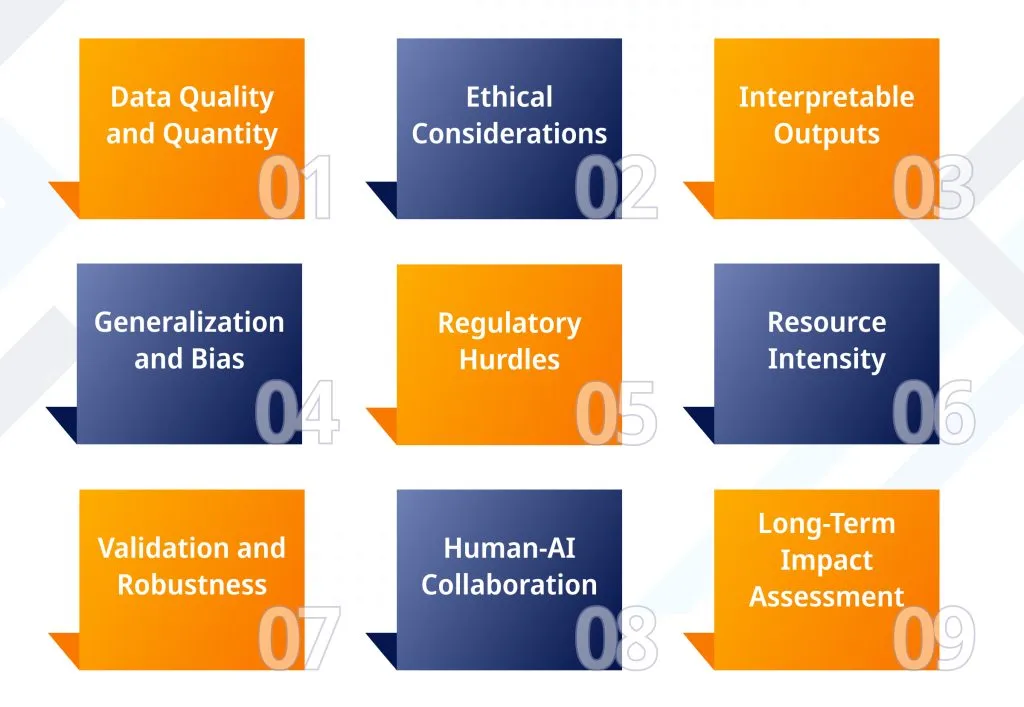
Data Quality and Quantity:
Challenge: Generative AI’s efficacy is directly tied to the quality and volume of data it’s trained on.
Implication: Limited or poor-quality data can compromise the model’s performance. Acquiring vast, diverse, and compliant datasets, especially in healthcare where privacy is paramount, is a significant challenge.
Ethical Considerations:
Challenge: The generation of patient data or medical images by AI brings forth ethical dilemmas.
Implication: Balancing technological advancements with concerns about privacy, consent, and potential misuse is a delicate task, emphasizing the need for ethical AI practices.
Interpretable Outputs:
Challenge: Deciphering the reasoning behind Generative AI’s outputs, especially in intricate medical contexts, can be complex.
Implication: For informed clinical decisions, there’s a pressing need for transparency and explainability in AI-generated results.
Generalization and Bias:
Challenge: AI models can unintentionally magnify biases present in their training data.
Implication: Addressing these biases is essential to ensure that healthcare outcomes are equitable and unbiased across diverse patient groups.
Regulatory Hurdles:
Challenge: The healthcare sector is bound by stringent regulations to ensure patient safety.
Implication: Integrating Generative AI necessitates navigating intricate approval processes and showcasing the model’s dependability.
Resource Intensity:
Challenge: Generative AI models require substantial computational power and expertise for training and maintenance.
Implication: This can be a challenge for healthcare institutions with constrained resources, impacting scalability and deployment.
Validation and Robustness:
Challenge: Validating the reliability of Generative AI models across varied healthcare scenarios is crucial.
Implication: Comprehensive testing is vital to prevent potential pitfalls from inaccurate or misleading outputs.
Human-AI Collaboration:
Challenge: Fostering a synergistic relationship between healthcare professionals and Generative AI is pivotal.
Implication: Medical practitioners must be adept at leveraging AI insights while preserving their clinical acumen.
Long-Term Impact Assessment:
Challenge: As Generative AI becomes more entrenched in healthcare, evaluating its long-term ramifications becomes essential.
Implication: Continuous monitoring of its effects on patient outcomes, cost metrics, and clinical methodologies ensures that the technology remains a boon and not a bane.
While Generative AI promises to reshape healthcare, its integration is riddled with challenges. Addressing these effectively will pave the way for a harmonious fusion of technology and healthcare, driving the sector towards unprecedented advancements.
The Future of AI and Healthcare
The intersection of healthcare and AI promises an awe-inspiring trajectory, poised to reshape the future of medicine. As we peer into the horizon, a landscape enriched by transformative possibilities unfolds before us:
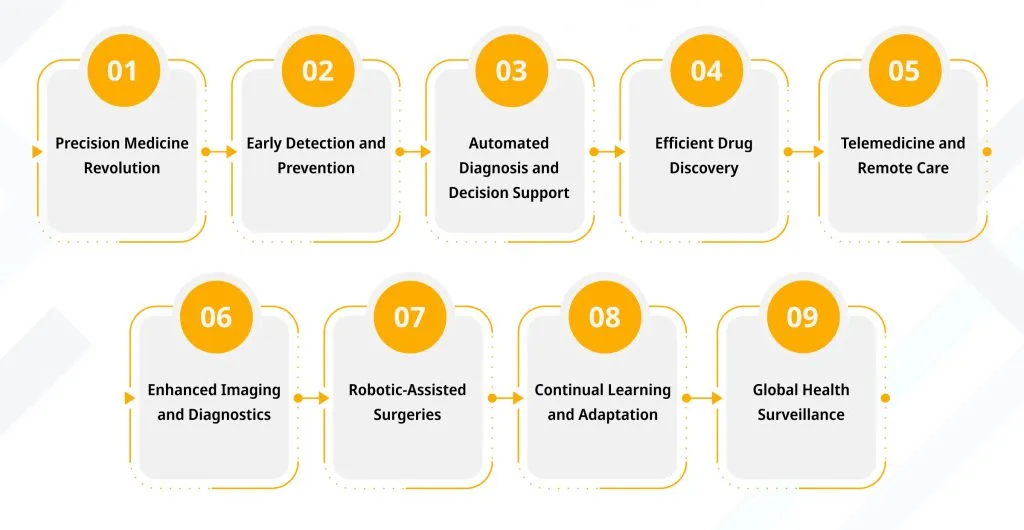
Precision Medicine Revolution:
AI’s capacity to analyze vast genetic and patient data heralds a new era of personalized medicine. Treatment plans tailored to an individual’s genetic makeup and medical history hold the potential to maximize efficacy while minimizing adverse effects, leading to unparalleled patient outcomes.
Early Detection and Prevention:
AI-powered algorithms excel in discerning subtle patterns, enabling early disease detection with heightened accuracy. This shift towards proactive intervention translates to earlier treatments, potentially thwarting the progression of illnesses and reducing healthcare burdens.
Automated Diagnosis and Decision Support:
Healthcare professionals stand to benefit from AI’s diagnostic acumen. AI-enhanced diagnostic tools offer reliable insights, assisting clinicians in complex decision-making processes and refining diagnostic accuracy.
Efficient Drug Discovery:
AI’s predictive prowess can expedite the arduous drug discovery process. As AI models identify promising drug candidates with remarkable efficiency, pharmaceutical breakthroughs may become more frequent, offering new avenues for tackling diseases.
Transforming Healthcare with Generative AI
Telemedicine and Remote Care:
AI-driven telemedicine platforms enable remote consultations and diagnostics, ensuring healthcare access for underserved populations and in remote areas. Virtual medical assistants powered by AI facilitate real-time patient interactions, enhancing the reach and efficiency of healthcare services.
Enhanced Imaging and Diagnostics:
AI’s proficiency in medical imaging augments the quality and speed of diagnostic procedures. Radiologists benefit from AI-generated insights, leading to swifter and more accurate diagnoses through enhanced image analysis.
Robotic-Assisted Surgeries:
AI-guided robotic systems amplify surgical precision, enabling minimally invasive procedures with improved outcomes. Surgeons can leverage real-time AI assistance during intricate surgeries, enhancing their capabilities and patient safety.
Continual Learning and Adaptation:
AI’s ability to learn and evolve from new data ensures that healthcare practices remain cutting-edge. As medical knowledge expands, generative AI in healthcare systems can update their algorithms, ensuring that diagnoses and treatments remain current.
Global Health Surveillance:
AI’s data processing prowess equips healthcare systems to track, predict, and manage disease outbreaks. By analyzing patterns in large datasets, AI contributes to rapid responses and proactive measures for global health challenges.
As healthcare and AI forge an inseparable bond, innovation spirals toward uncharted territories. The symbiotic partnership holds the potential to revolutionize patient care, amplify medical discoveries, and catalyze a healthier, more connected world. The journey ahead teems with anticipation, offering a future where the convergence of healthcare and AI yields a tapestry of unprecedented possibilities.
Parting Thoughts
Generative AI in healthcare emerges as a transformative force, painting a canvas of innovation across diagnostics, treatment, and patient care. Its prowess in drug discovery, disease diagnosis, and personalized treatment plans heralds a future where precision and efficiency intertwine harmoniously.
Challenges notwithstanding, Generative AI’s potential to reshape the healthcare landscape remains undeniable. As we traverse this evolving landscape, the harmonious synergy between AI and healthcare beckons us toward a future where patient well-being and medical advancement converge.
Embrace the evolution. Embrace tomorrow. Explore how Generative AI is redefining healthcare with us at ValueCoders.


